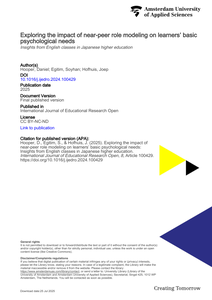Although near-peer role modeling (NPRM) has been suggested as an effective pedagogical intervention for boosting confidence, motivation, and self-efficacy, few studies have examined its connection with learner needs and well-being utilizing an established psychological framework. The present study investigates the pedagogical role of NPRM within English classes in Japanese higher education from the perspective of basic psychological need (BPN) satisfaction and frustration. In this two-phase explanatory mixed methods study, two quantitative scales were utilized to assess the significance of the connections between NPRM and six subcategories of BPN satisfaction or frustration. Subsequently, a qualitative investigation with a more limited sample size was conducted to elucidate and expand upon these associations. The quantitative findings revealed NPRM to be a significant predictor of students’ autonomy and relatedness satisfaction and exhibited a negative correlation with students' autonomy and relatedness frustration. However, no discernible association was observed between NPRM and competence satisfaction or frustration. The qualitative data revealed that the students’ mixed feelings of competence may have stemmed from low confidence and L2 self-concept with some students comparing themselves unfavorably to near-peer role models. The study highlights the need for NPRM interventions to be accompanied by instruction related to learner beliefs or growth mindsets.
DOCUMENT

The purpose of this study was to examine whether Canadian, Chinese, and Japanese university students' leisure satisfaction affected their subjective well-being (SWB) and, if so, how this process was similar and different cross-culturally/nationally. A series of stepwise multiple regressions indicated that, in general, satisfying leisure significantly and positively impacted SWB across all three cultures, but there were also differences between (a) Canada and both China and Japan in terms of aesthetic leisure satisfaction and (b) China and Japan in terms of psychological and physiological leisure satisfaction. Overall, our results suggest that while satisfying leisure significantly, positively, and substantively impacts SWB in both Western and East Asian cultural contexts, culture frequently influences which specific elements are pertinent. This cross-cultural/national study has important theoretical and practical implications for the currently Western-centric leisure literature and for the understanding of the different roles leisure plays in enhancing SWB across cultures, respectively.
LINK
This paper reports on a multiple-case study of five participants in a school-university research network in a Dutch master's program. Outcomes indicate that use of existing network structures in master's programs is complex, but could be a promising avenue for creating succesful school-university networks.
LINK